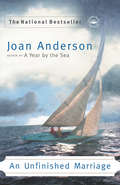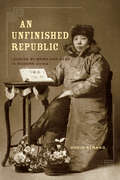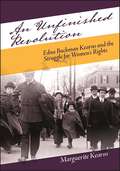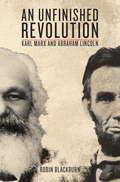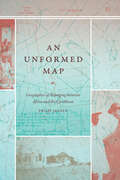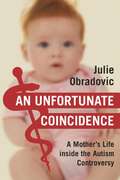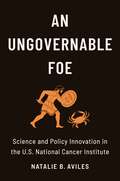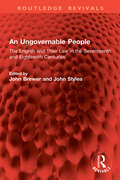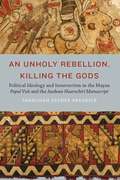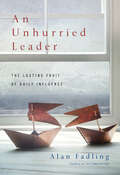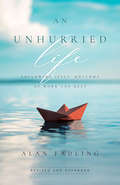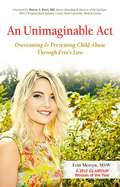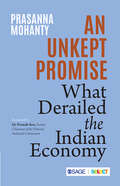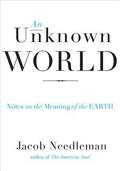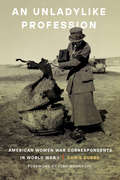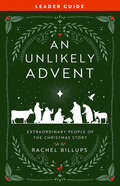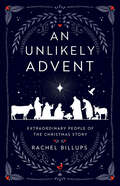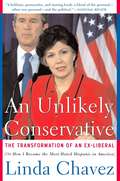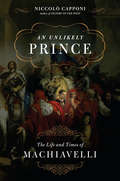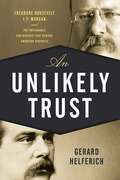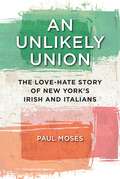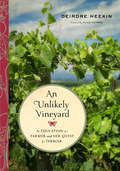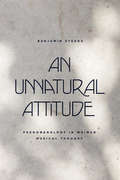- Table View
- List View
An Unfinished Marriage
by Joan AndersonIn a YEAR BY THE SEA Joan Anderson's brave decision to take a year off from her marriage, her frank assessment of herself at midlife and the fears and triumphs of going it alone struck a chord with women everywhere - and inspired many other women to find the courage to recreat their life. So when she sets out after her magical year of self-discovery to try to repair her marriage, the outcome is far from certain. Thriving on her newfound freedom and now fiercely independent, she must now adjust to sharing her new life. When Joan is incapacitated by a broken ankle, she at first resents her husband's clumsy attempts to take care of her and run the home without her. But, left to his own devices, he reveals an unexpectedly tender and resourceful side. They begin to create a tentative new partnership, seasoned by years of marriage but awakened to the exciting new possibilities of a future together. A unique and timely true story, An UNFINISHED MARRIAGE will provide shocks of recognition and fresh hope for anyone facing the challenges of finding freedom and happiness with someone else.
An Unfinished Republic: Leading by Word and Deed in Modern China
by David StrandIn this cogent and insightful reading of China's twentieth-century political culture, David Strand argues that the Chinese Revolution of 1911 engendered a new political life--one that began to free men and women from the inequality and hierarchy that formed the spine of China's social and cultural order. Chinese citizens confronted their leaders and each other face-to-face in a stance familiar to republics worldwide. This shift in political posture was accompanied by considerable trepidation as well as excitement. Profiling three prominent political actors of the time--suffragist Tang Qunying, diplomat Lu Zhengxiang, and revolutionary Sun Yatsen--Strand demonstrates how a sea change in political performance left leaders dependent on popular support and citizens enmeshed in a political process productive of both authority and dissent.
An Unfinished Revolution: Edna Buckman Kearns and the Struggle for Women's Rights (Excelsior Editions)
by Marguerite KearnsThrough the lens of one family's history, An Unfinished Revolution tells the story of the suffrage movement and the ongoing struggle for women's rights in the United States. The book opens with ten-year-old Marguerite Kearns listening to her grandfather Wilmer's stories about how he met her grandmother Edna, a ninth-generation Quaker and ardent suffrage campaigner, and how he fell in love with her. Wilmer, who became a male suffrage activist himself, also shares the story of the "Spirit of 1776" suffrage campaign wagon that Edna and others used while organizing in New York State in 1913. After sitting for years in a Kearns family garage, the wagon is currently housed in the permanent collection of the New York State Museum as a prime artifact in the national suffrage movement.As Marguerite grows older, she draws on a wide variety of sources—from family stories and photographs to archives and scholarly histories—to piece together the real-life narrative of her family. Profoundly changed in the process, she becomes an activist herself, and when she marches in a present-day women's march, she carries a photo of her grandparents participating in a 1914 women's march in New York. With the women's suffrage movement as the backdrop, this memoir and family history illuminates how activism passes from one generation to another—and how a horse-drawn suffrage campaign wagon became a symbol of freedom and equality.
An Unfinished Revolution: Karl Marx and Abraham Lincoln
by Abraham Lincoln Friedrich Engels Karl Marx Robin Blackburn Raya DunaevskayaKarl Marx and Abraham Lincoln exchanged letters at the end of the Civil War, with Marx writing on behalf of the International Working Men's Association. Although they were divided by far more than the Atlantic Ocean, they agreed on the urgency of suppressing slavery and the cause of "free labor." In his introduction Robin Blackburn argues that Lincoln's response to the IWA was a sign of the importance of the German American community as well as of the role of the International in opposing European recognition of the Confederacy. The International went on to attract many thousands of supporters in over fifty regions of the US, and helped to spread the demand for an eight-hour day--enacted by Congress in 1868 for Federal employees. Blackburn shows how the International in America--born out of the Civil War--sought to radicalize Lincoln's unfinished revolution and to advance the rights of labor, uniting black and white, men and women, native and foreign-born. The International contributed to a profound critique of the capitalist robber barons who enriched themselves during and after the war. It inspired an extraordinary series of strikes and class struggles in the postwar decades. In addition to a range of key texts and letters by both Lincoln and Marx, this book includes Raya Dunaevskaya's assessment of the impact of the Civil War on Marx's theory and a survey by Frederick Engels of the progress of US labor in the 1880s.
An Unformed Map: Geographies of Belonging between Africa and the Caribbean (Theory in Forms)
by Philip JanzenIn An Unformed Map, Philip Janzen traces the intellectual trajectories of Caribbean people who joined the British and French colonial administrations in Africa between 1890 and 1930. Caribbean administrators grew up in colonial societies, saw themselves as British and French, and tended to look down on Africans. Once in Africa, however, they were doubly marginalized—excluded by Europeans and unwelcome among Africans. This marginalization was then reproduced in colonial archives, where their lives appear only in fragments. Drawing on sources beyond the archives of empire, from dictionaries and language exams to a suitcase full of poems, Janzen considers how Caribbean administrators reckoned with the profound effects of assimilation, racism, and dislocation. As they learned African languages, formed relationships with African intellectuals, and engaged with African cultures and histories, they began to rethink their positions in the British and French empires. They also created new geographies of belonging across the Atlantic, foundations from which others imagined new political horizons. Ultimately, Janzen offers a model for reading across sources and writing history in the face of archival fragmentation.
An Unfortunate Coincidence: A Mother's Life inside the Autism Controversy
by Julie ObradovicIn her poignant account, Julie Obradovic discusses her heart-rending struggle with her daughter's autism and her subsequent quest for answers. She reveals the feelings of depression and helplessness brought on by the diagnosis and her initial inability to find help. Unwilling to give up, however, Obradovic began fighting, finding a treatment for her daughter and going on to campaign on behalf of others. An Unfortunate Coincidence is the result of this fight. The account takes its readers through the political, historical, and scientific developments behind the greatest medical controversy of our time, including: The findings of the vaccine injury compensation program Investigations of CDC fraud and the subsequent congressional hearings and findings The identical symptoms of autism and mercury poisoning Eyewitness reports of families and educators The author's struggle to present her point of view and the backlash intended to silence itUltimately, An Unfortunate Coincidence will ask the readers to take a closer look at the evidence uncovered by ten years of research and decide just how many coincidence claims they are willing to accept.
An Ungovernable Foe: Science and Policy Innovation in the U.S. National Cancer Institute
by Natalie B. AvilesIn American politics, medical innovation is often considered the domain of the private sector. Yet some of the most significant scientific and health breakthroughs of the past century have emerged from government research institutes. The U.S. National Cancer Institute (NCI) is tasked with both understanding and eradicating cancer—and its researchers have developed a surprising expertise in virus research and vaccine development.An Ungovernable Foe examines seventy years of federally funded scientific breakthroughs in the laboratories of the NCI to shed new light on how bureaucratic organizations nurture innovation. Natalie B. Aviles analyzes research and policy efforts around the search for a viral cause of leukemia in the 1960s, the discovery of HIV and the development of AIDS drugs in the 1980s, and the invention of the HPV vaccine in the 1990s. She argues that the NCI transformed generations of researchers into innovative public servants who have learned to balance their scientific and bureaucratic missions. These “scientist-bureaucrats” are simultaneously committed to conducting cutting-edge research and stewarding the nation’s investment in cancer research, and as a result they have developed an unparalleled expertise. Aviles demonstrates how the interplay of science, politics, and administration shaped the NCI into a mission-oriented agency that enabled significant breakthroughs in cancer research—and in the process, she shows how organizational cultures indelibly stamp scientific work.
An Ungovernable People: The English and Their Law in the Seventeenth and Eighteenth Centuries (Routledge Revivals)
by John Brewer John StylesHow ungovernable were seventeenth- and eighteenth-century Englishmen? Certainly, the historical evidence attests to an unruly and contumacious populace: riot was widespread, such criminal activities as the counterfeiting of coin flourished, disorder pervaded even London’s gaols, and men at all levels of authority were often hard pressed to enforce the law. On the other hand, the ruling elite had a powerful instrument—the courts—for regulating not only crime but also numerous aspects of social and economic life. Moreover, belief in the value of ‘the rule of law’ was widespread, even among lawbreakers. Knowledge of the law extended far beyond the patrician class, and men from all classes had recourse to the courts.First published in 1980, An Ungovernable People investigates these paradoxes. Each chapter focusses on a particular source of conflict—village regulation, the price and shipment of grain, the building of turnpike roads, the imprisonment of debtors, the circulation of counterfeit coin—to assess attitudes to ‘the law’ and to authority.Particular emphasis is placed on the judicial process—how the legal system actually worked; on how often popular protest was an attempt to remind authority of its duties rather than to challenge its legitimacy; and on the way in which law-breaking frequently formed part of a negotiative process between rulers and ruled. These chapters contribute to our understanding of the conflicts that arose when popular notions of what was just or legitimate clashed with authority and the letter of law.
An Unholy Rebellion, Killing the Gods: Political Ideology and Insurrection in the Mayan Popul Vuh and the Andean Huarochiri Manuscript
by Sharonah Esther FredrickThis groundbreaking work in literature, cultural studies, and history compares the two greatest epics of the Indigenous peoples of Latin America: the Popul Vuh of the Quiché Maya of Guatemala and the Huarochiri Manuscript of Peru&’s lower Andean regions.
An Unhurried Leader: The Lasting Fruit of Daily Influence
by Alan FadlingWhat does it look like to let Jesus set the pace for your leadership? Through biblical illustrations, personal examples, and on-the-ground leadership wisdom, Alan Fadling guides you into a new view of kingdom leadership. You might just find that the whole of your life is transformed into a more livable and more fruitful pace.
An Unhurried Life: Following Jesus' Rhythms of Work and Rest
by Alan FadlingThe 2014 Christianity Today Book Award of Merit Winner (Spirituality)"I am a recovering speed addict."An Unhurried Life
An Unimaginable Act: Overcoming and Preventing Child Abuse Through Erin's Law
by Erin MerrynBy sharing her personal journey through the pain she has suffered at the hands of her perpetrators, author Erin Merryn proves that one person can make a difference in the lives of others. Simply by speaking out and bringing the subject of child sexual abuse to the forefront, she has created a wave of change—change not only in legislature, but also in the hearts of those around her and the world. In this thought-provoking book, readers will discover an in-depth, personal account of Erin's story and how—through using positive outlets—she was able to rebuild her life and heal from a childhood filled with sexual abuse. Part memoir, part resource guide, Erin shares with readers key organizations that provide essential support for victims and caregivers, warning signs that a child who is being abused might display, and why Erin's Law is so essential.
An Uninvited Guest
by Jeana FloydShare one woman's empowering journey through cancer. An inspiring, gentle look at every woman's terror: breast cancer. Written by the wife of one of America's best-known pastors, Ronnie Floyd, this sensitive treatment takes the reader all the way through the stages of cancer: diagnosis, treatment options, emotional issues, and a way forward. Not preachy, but bathed in healing love, this book makes a perfect gift for women from all walks of life. Floyd takes women through the fears faced by those diagnosed with breast cancer, to losing their hair to losing a breast. Follow her journey as she shares how she learned to face the fears and challenges of breast cancer with grace, hope, and humor.
An Unkept Promise: What Derailed the Indian Economy
by Prasanna MohantyThe COVID-19 pandemic hit the Indian economy that was already reeling under the shocks of demonetization and GST. The economy wasn’t robust to withstand a fresh shock. Has the ‘Tyrst with Destiny at Midnight’ soured? An Unkept Promise: What Derailed the Indian Economy looks at some of the pre-pandemic economic decisions and the string of reforms implemented during the pandemic crisis such as new farm laws, new labour codes, decisions to privatize profitable public sector units and de-nationalize banks, and the proposed move to allow corporations to run banks. With hard evidence and data, the book tries to diagnose what has gone wrong and why? It also examines the role of key democratic institutions of checks and balances in policymaking such as Parliament, Niti Aayog, Supreme Court, media and citizenry. As cronyism grows and stock market booms, millions have lost their jobs and incomes, the book warns against neo-liberal economic thinking and suggests corrective measures to get the economy back on track.
An Unknown World
by Jacob NeedlemanThe bestselling philosopher's unforgettable exploration of the true meaning of life on earth, now in paperback for the first time. What is the purpose of life on earth? In An Unknown World, philosopher Jacob Needleman frames man's role on the planet in a completely new and fresh way, moving beyond the usual environmental concerns to reveal how the care and maintenance of a world is something vital and basic to our existence as authentic human beings. "Striking . . . takes some really original positions on topics that have become run into the ground by the same discussions and same assumptions." --Ken Wilbur "His lively prose, storytelling skills and lucid insights draw us into an animated conversation with a brilliant teacher." --Publishers Weekly
An Unladylike Profession: American Women War Correspondents in World War I
by Chris DubbsWhen World War I began, war reporting was a thoroughly masculine bastion of journalism. But that did not stop dozens of women reporters from stepping into the breach, defying gender norms and official restrictions to establish roles for themselves—and to write new kinds of narratives about women and war. Chris Dubbs tells the fascinating stories of Edith Wharton, Nellie Bly, and more than thirty other American women who worked as war reporters. As Dubbs shows, stories by these journalists brought in women from the periphery of war and made them active participants—fully engaged and equally heroic, if bearing different burdens and making different sacrifices. Women journalists traveled from belligerent capitals to the front lines to report on the conflict. But their experiences also brought them into contact with social transformations, political unrest, labor conditions, campaigns for women&’s rights, and the rise of revolutionary socialism. An eye-opening look at women&’s war reporting, An Unladylike Profession is a portrait of a sisterhood from the guns of August to the corridors of Versailles. Purchase the audio edition.
An Unlikely Advent Leader Guide: Extraordinary People of the Christmas Story
by Rachel BillupsExpect the unexpected this Christmas.This four-week Advent study focuses on the experiences of four sets of often overlooked characters in the Nativity story. During this Advent season, Rachel Billups guides readers through the themes of hope, love, joy, and peace by sharing the stories of Elizabeth and Zechariah, Herod, the Magi, and the shepherds. Each set of unexpected characters has something to teach about living faithfully on the journey to Christmas.The Leader Guide contains everything needed to guide a group through the four-week study, including session plans, activities, discussion questions, and multiple format options. Additional components for the four-week small group study include the book and DVD/Video Sessions featuring Rachel Billups.
An Unlikely Advent: Extraordinary People of the Christmas Story
by Rachel BillupsExpect the unexpected this Christmas.This four-week Advent study focuses on the experiences of four sets of often overlooked characters in the Nativity story. During this Advent season, Rachel Billups guides readers through the themes of hope, love, joy, and peace by sharing the stories of Elizabeth and Zechariah, Herod, the Magi, and the shepherds. Each set of unexpected characters has something to teach about living faithfully on the journey to Christmas.Additional components to use the book as a four-week small group study include a leader guide and DVD/Video Sessions featuring Rachel Billups.
An Unlikely Conservative: The Transformation of an Ex-Liberal
by Linda ChavezWhen President George W. Bush nominated Linda Chavez to be Secretary of Labor in 2001, few people realized that this hard-nosed conservative began her career among socialists and labor union officials, teaching in college affirmative action programs and writing political propaganda for the Democratic National Committee. An Unlikely Conservative chronicles Chavez's journey from a poverty-stricken childhood to prominence as one of the most influential public policy advocates in the nation, and the sometimes shocking experiences that shaped her views along the way.
An Unlikely Journey: Waking Up from My American Dream
by Julian CastroThe keynote speaker at the 2012 DNC, former San Antonio mayor and Secretary of Housing and Urban Development, Julian Castro, tells his remarkable and inspiring life story. In the spirit of a young Barack Obama's Dreams from My Father, comes a candid and compelling memoir about race and poverty in America. In many ways, there was no reason Julian Castro would have been expected to be a success. Born to unmarried parents in a poverty-stricken neighborhood of a struggling city, his prospects of escaping his circumstance seemed bleak. But he and his twin brother Joaquin had something going for them: their mother. A former political activist, she provided the launch pad for what would become an astonishing ascent. Julian and Joaquin would go on to attend Stanford and Harvard before entering politics at the ripe age of 26. Soon after, Joaquin become a state representative and Julian was elected mayor of San Antonio, a city he helped revitalize and transform into one of the country's leading economies. His success in Texas propelled him onto the national stage, where he was the keynote speaker at the 2012 DNC--the same spot President Obama held three conventions prior--and then to Washington D.C. where he served as the Obama Administration's Secretary of Housing and Urban Development. After being shortlisted as a potential running mate for Hillary Clinton, he is now seen by many as a future presidential candidate. Julian Castro's story not only affirms the American dream, but also resonates with millions, who in an age of political cynicism and hardening hearts are searching for a new hero. No matter one's politics, this book is the transcendent story of a resilient family and the unlikely journey of an emerging national icon.
An Unlikely Prince: The Life and Times of Machiavelli
by Niccolo CapponiIn this compelling new biography, historian Niccolò Capponi frees Machiavelli (1469-1527) from centuries of misinterpretation. Exploring the Renaissance city of Florence, where Machiavelli lived, Capponi reveals the man behind the legend. A complex portrait of Machiavelli emerges-at once a brilliantly skillful diplomat and a woefully inept liar; a sharp thinker and an impractical dreamer; a hardnosed powerbroker and a risk-taking gambler; a calculating propagandist and an imprudent jokester. Capponi’s intimate portrait of Machiavelli reveals his behavior as utterly un-Machiavellian, his vision of the world as limited by his very provincial outlook. In the end, Machiavelli was frustrated by his own political failures and utterly baffled by the success of his bookThe Prince.
An Unlikely Trust: Theodore Roosevelt, J.P. Morgan, and the Improbable Partnership That Remade American Business
by Gerard HelferichAt the dawn of the twentieth century, Theodore Roosevelt and J. Pierpont Morgan were the two most powerful men in America, perhaps the world. As the nation&’s preeminent financier, Morgan presided over an elemental shift in American business, away from family-owned companies and toward modern corporations of unparalleled size and influence. As president, Theodore Roosevelt expanded the power of that office to an unprecedented degree, seeking to rein in those corporations and to rebalance their interests with those of workers, consumers, and society at large.Overpowering figures and titanic personalities, Roosevelt and Morgan could easily have become sworn enemies. And when they have been considered together (never before at book length), they have generally been portrayed as battling colossi, the great trust builder versus the original trustbuster. But their long association was far more complex than that, and even mutually beneficial.Despite their many differences in temperament and philosophy, Roosevelt and Morgan had much in common—social class, an unstinting Victorian moralism, a drive for power, a need for order, and a genuine (though not purely altruistic) concern for the welfare of the nation. Working this common ground, the premier progressive and the quintessential capitalist were able to accomplish what neither could have achieved alone—including, more than once, averting national disaster. In the process they also changed forever the way that government and business worked together.An Unlikely Trust is the story of the uneasy but fruitful collaboration between Theodore Roosevelt and Pierpont Morgan. It is also the story of how government and business evolved from a relationship of laissez-faire to the active regulation that we know today. And it is an account of how, despite all that has changed in America over the past century, so much remains the same, including the growing divide between rich and poor; the tangled bonds uniting politicians and business leaders; and the pervasive feeling that government is working for the special interests rather than for the people. Not least of all, it is the story of how citizens with vastly disparate outlooks and interests managed to come together for the good of their common country.
An Unlikely Union: The Love-Hate Story of New York's Irish and Italians
by Paul MosesThey came from the poorest parts of Ireland and Italy, and met as rivals on the sidewalks of New York. In the nineteenth century and for long after, the Irish and Italians fought in the Catholic Church, on the waterfront, at construction sites, and in the streets. Then they made peace through romance, marrying each other on a large scale in the years after World War II. An Unlikely Union unfolds the dramatic story of how two of America's largest ethnic groups learned to love and laugh with each other in the wake of decades of animosity. The vibrant cast of characters features saints such as Mother Frances X. Cabrini, who stood up to the Irish American archbishop of New York when he tried to send her back to Italy, and sinners like Al Capone, who left his Irish wife home the night he shot it out with Brooklyn's Irish mob. Also highlighted are the love affair between radical labor organizers Elizabeth Gurley Flynn and Carlo Tresca; Italian American gangster Paul Kelly's alliance with Tammany's "Big Tim" Sullivan; hero detective Joseph Petrosino's struggle to be accepted in the Irish-run NYPD; and Frank Sinatra's competition with Bing Crosby to be the country's top male vocalist. In this engaging history of the Irish and Italians, veteran New York City journalist and professor Paul Moses offers an archetypal American story. At a time of renewed fear of immigrants, it demonstrates that Americans are able to absorb tremendous social change and conflict--and come out the better for it.
An Unlikely Vineyard
by Alice Feiring Deirdre HeekinAn Unlikely Vineyard tells the evolutionary story of Deirdre Heekin's farm from overgrown fields to a fertile, productive, and beautiful landscape that melds with its natural environment. Is it possible to capture landscape in a bottle? To express its terroir, its essence of place--geology, geography, climate, and soil--as well as the skill of the winegrower? That's what Heekin and her chef/husband, Caleb Barber, set out to accomplish on their tiny, eight-acre hillside farm and vineyard in Vermont. But An Unlikely Vineyard involves much more. It also presents, through the example of their farming journey and winegrowing endeavors, an impressive amount of information on how to think about almost every aspect of gardening: from composting to trellising; from cider and perry making to growing old garden roses, keeping bees, and raising livestock; from pruning (or not) to dealing naturally with pests and diseases. Challenged by cold winters, wet summers, and other factors, Deirdre and Caleb set about to grow not only a vineyard, but an orchard of heirloom apples, pears, and plums, as well as gardens filled with vegetables, herbs, roses, and wildflowers destined for their own table and for the kitchen of their small restaurant. They wanted to create, or rediscover, a sense of place, and to grow food naturally using the philosophy and techniques gleaned from organic gardening, permaculture, and biodynamic farming. Accompanied throughout by lush photos, this gentle narrative will appeal to anyone who loves food, farms, and living well.
An Unnatural Attitude: Phenomenology in Weimar Musical Thought (New Material Histories of Music)
by Benjamin SteegeAn Unnatural Attitude traces a style of musical thought that coalesced in the intellectual milieu of the Weimar Republic—a phenomenological style that sought to renew contact with music as a worldly circumstance. Deeply critical of the influence of naturalism in aesthetics and ethics, proponents of this new style argued for the description of music as something accessible neither through introspection nor through experimental research, but rather in an attitude of outward, open orientation toward the world. With this approach, music acquires meaning in particular when the act of listening is understood to be shared with others. Benjamin Steege interprets this discourse as the response of a young, post–World War I generation amid a virtually uninterrupted experience of war, actual or imminent—a cohort for whom disenchantment with scientific achievement was to be answered by reasserting the value of imaginative thought. Steege draws on a wide range of published and unpublished texts from music theory, pedagogy, criticism, and philosophy of music, some of which appear for the first time in English translation in the book’s appendixes. An Unnatural Attitude considers the question: What are we thinking about when we think about music in non-naturalistic terms?
